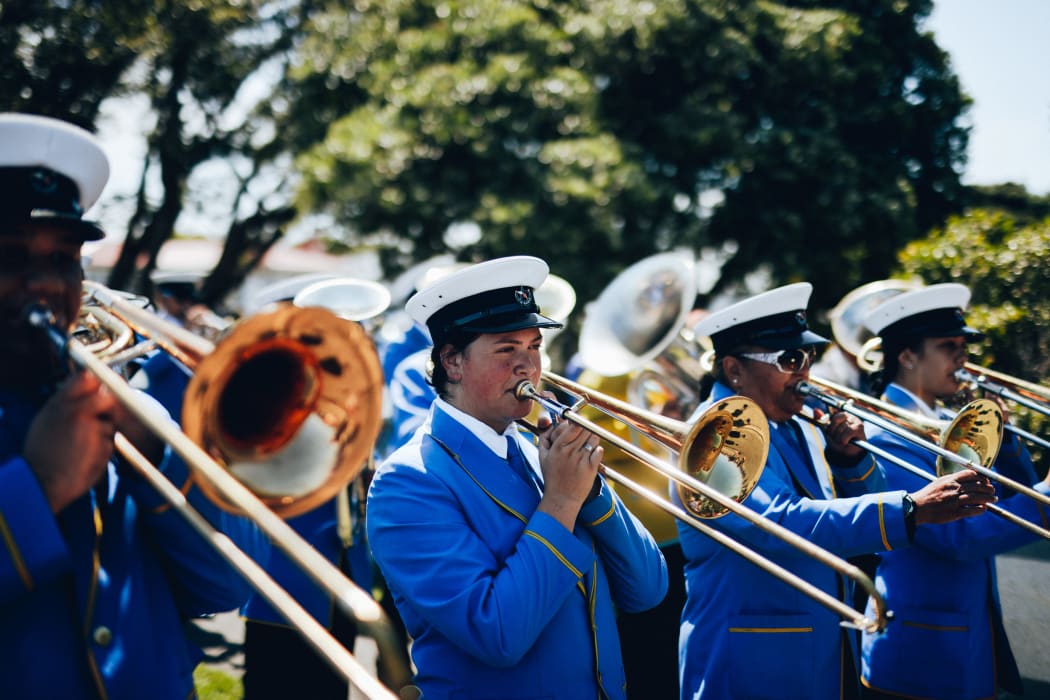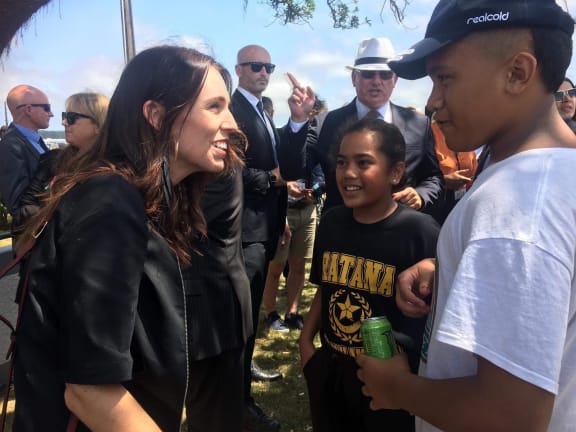The celebrations at Rātana in January are often described by media as the event that kicks off the political year because party leaders, Māori politicians and the media are among the manuhiri. This year far fewer guests were invited - including mainstream media journalists - and coverage was scant. But one former reporter tells Mediawatch it may be no bad thing.

A band leads the procession of followers into Rātana temple as morehu celebrate the birthday of the faith's founder on 25 January, 2021. Photo: RNZ / Dom Thomas
If you sneak a peak at a political journalist’s diary or their wall planner, one of the first entries for the year each year will be ‘Rātana’.
For years, the annual celebrations every January at Rātana pā near Whanganui have kicked off the political year ahead of Waitangi commemorations and MPs descending on Wellington for the Parliamentary year.
The Rātana ceremonies usually attract invited political party leaders - including the prime minister - as well as Māori leaders, kaumatua and mōrehu - the followers - of the Rātana church and faith from around the country.
But this week only a few Labour MPs with ties to the faith attended this year’s events. No other politicians were among the manuhiri.
That was due to disagreements at the pā and among the church's executive committee about who to invite - and wider rifts within the church over its future leadership.
And all that meant far fewer reporters turned up as well.
But one who did was Stuff’s Joel Maxwell.
“Internal disagreements also appeared to have spilled over for media, with the organisers requiring Stuff to sign a media accreditation agreement that would make Stuff run a lengthy disclaimer prominently at the top of any story,” he reported.
“The disclaimer stated that the opinions of people interviewed in the story did not necessarily reflect the official policy of the church or its national executive,” he wrote
Joel Maxwell said Stuff did not sign the agreement nor abide by the terms.
But a former reporter writing about this in the Whanganui Chronicle last week said the absence of politicians - and the media - this year at Rātana may be no bad thing.

Prime Minister Jacinda Ardern at Rātana Pā. Photo: RNZ/Te Aniwa Hurihanganui
Former RNZ reporter Leigh-Marama McLachlan said she has been uncomfortable with politicians taking centre stage at Rātana.
“The media portrayal of the event is often white-washed and their presence at times feels intrusive,” Leigh-Marama McLachlan, who is now communications manager for the iwi, Ngā Tāngata Tiaki o Whanganui, wrote in the Chronicle.
“Aside from some confusion around conflicting dates and what is happening, my guess is it's probably going to be a much more enjoyable event for mōrehu without the politicians and media there anyway.

Leigh-Marama McLachlan - former RNZ reporter, now communications Manager the Ngā Tāngata Tiaki o Whanganui and a Whanganui Chronicle columnist. Photo: RNZ
“It is important to note that the 25th is not for us nor for politicians, it is for mōrehu. Many journalists have just returned from holidays and are champing at the bit to get back into things. From first-hand experience, most newsrooms see the event as newsworthy only for the fact that Ardern and other MPs are there,” she wrote.
“The mana and enduring legacy of Rātana is massive in its own right and this time is about him, and his people. Not the politicians. Not the media,” she wrote in the Chronicle.
One of the reasons few guests including media were present this year was the internal divisions among the Rātana leaders, who clearly didn't want to deal with that issue in the media. But surely an important and colourful event in the Māori calendar - and the political one - should be covered in the media?
“We need to understand the whakapapa to that thought and with that comes from. The church welcomed Māori media this year so maybe we need to reflect on past coverage and ask ourselves why this time there was a lack of trust around mainstream media among the members of the church,” she said.
The chairman of the Rātana Church executive urging a break with Labour was certainly newsworthy - but it was under-reported because so few reporters were there.
“The relationship between Rātana and the government is an important one but sometimes when I’ve been at the reporting I’ve noticed every year you have this huge contingent of political reporters huddling around in a particular place waiting for the politicians,” she told Mediawatch.
“It’s really clear their entire focus is on the politicians and the prime minister - and what sort of story the politicians will sell to get the Māori vote,” she said.
"It doesn’t feel like they’re there to shine a light on what happens at Rātana or sharing some history about (founder) Tahupōtiki Wiremu Rātana. And I’ve always felt really uncomfortable with it,” she said.
“It’s a missed opportunity to understand more about Rātana,” she said.
McLachlan said on occasions she had tried to start reports with information and descriptions of what was happening on the ground.
“I was reporting one day live and I told the producer I was going to start talking about the anniversary in the events in the church. I was told: "No. We will start with what the prime minister has just said on the paepae because it has news value now,” she said.
“I do hope that the politicians will come back. It is an important opportunity for te ao Māori to confront the government over outcomes for Māori and the opportunity to elevate their concerns in a public space. But this year in particular I was comfortable with politicians not being there - and I do think that ultimately they needed that time away from the public eye to focus on mending relationships within the church,” she told Mediawatch.
“It will be a shame if planned events at Waitangi are cancelled next week. That’s two missed opportunities for Māori to hold the government to account – and we don’t get them often. I wouldn’t like this to set a precedent at all for future hui,” she said.

